剑桥(join in)版2019-2020年五年级英语下册 Unit 3(3a,3b) 教案
剑桥(join in)版小学英语五年级下册单元知识梳理总结(全册)

剑桥(join in)版小学英语五年级下册单元知识梳理总结(全册)Start unit: XXXFirst。
let'XXX:Touch: to come into contact with somethingHead: the part of the body above the XXX。
eyes。
nose。
and mouthEnjoy: to take pleasure in somethingNear: close to something or someoneXXX: every personShake hands: to grasp someone's hand and move it up and down as a greetingFun: XXXAlphabet: a XXXNext。
XXX:1.Touch your nose and shake your head.2.e back now.3.Learning can be lots of fun.4.Enjoy your time in class again.5.XXX.6.XXX.7.XXX around.8.Dance with me.Now XXX and friends:We can use the "There be" sentence pattern。
such as "There is" for singular or uncountable nouns。
and "There are" for plural nouns.When introducing a friend。
we can n their age。
birthday。
country of origin。
skills。
hobbies。
daily routine。
etc.Lastly。
剑桥(join in)版2019-2020年五年级英语下册 Unit 1~Unit 3 单元检测
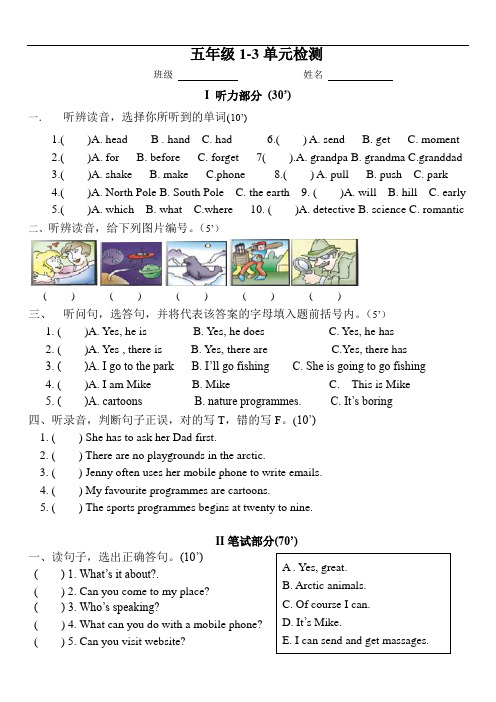
五年级1-3单元检测班级 __ 姓名 _____________I 听力部分 (30’)一. 听辨读音,选择你所听到的单词(10’)1.( )A. head B . hand C. had 6.( ) A. send B. get C. moment2.( )A. for B. before C. forget 7( ).A. grandpa B. grandma C.granddad3.( )A. shake B. make C.phone 8.( ) A. pull B. push C. park4.( )A. North Pole B. South Pole C. the earth 9. ( )A. will B. hill C. early5.( )A. which B. what C.where 10. ( )A. detective B. science C. romantic 二、听辨读音,给下列图片编号。
(5’)( ) ( ) ( ) ( ) ( )三、 听问句,选答句,并将代表该答案的字母填入题前括号内。
(5’)1. ( )A. Yes, he is B. Yes, he does C. Yes, he has2. ( )A. Yes , there is B. Yes, there are C.Yes, there has3. ( )A. I go to the park B. I’ll go fishing C. She is going to go fishing4. ( )A. I am Mike B. Mike C. This is Mike5. ( )A. cartoons B. nature programmes. C. It’s boring四、听录音,判断句子正误,对的写T ,错的写F 。
(10’)1. ( ) She has to ask her Dad first.2. ( ) There are no playgrounds in the arctic.3. ( ) Jenny often uses her mobile phone to write emails.4. ( ) My favourite programmes are cartoons.5. ( ) The sports programmes begins at twenty to nine.II 笔试部分(70’)一、读句子,选出正确答句。
剑桥(join in)版小学英语五年级下册单元同步练习试题(全册)
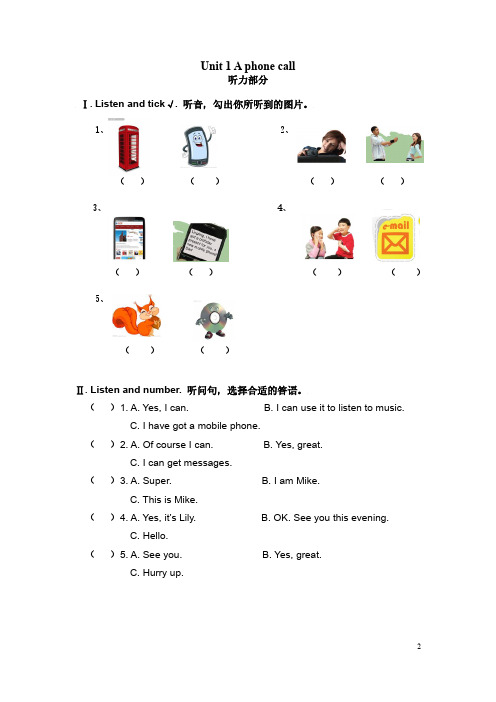
_________ games. We can use it to _______ your favourite websites and
even ______ and choose. 看图,读句子,选择正确的序号填入故事的空白 处。
1. Where are the eggs? 3. What can I do?
I can
,
and
.
I can
and .
Ⅳ. Listen and write T or F. 听音,判断句子是否与所听对话是否相符,相符的 写“T”,不相符的写“F”。 ( ) 1. Judy and Sarah are making phone call. ( ) 2. Judy has got a new DVD. ( ) 3.The DVD is about animals. ( ) 4. Judy can’t come to Sarah’s place this afternoon. She has to ask mum first. ( ) 5. Judy is going to Sarah’s place this evening.
Ⅳ. Read and fill in the blanks.读一读,选择正确的单词填空。
house boring
is
playground
fish
happy
shopping malls
Nicola goes to her grandparents’________ . It’s ____ there. There are no ________, no playground. There _____ no TV. Nicola’s grandfather wakes her up in the morning. They go fishing. They get some ___ for lunch. They are going to the _______ tomorrow. She is very_____.
五年级下册英语剑桥Join in知识要点汇总
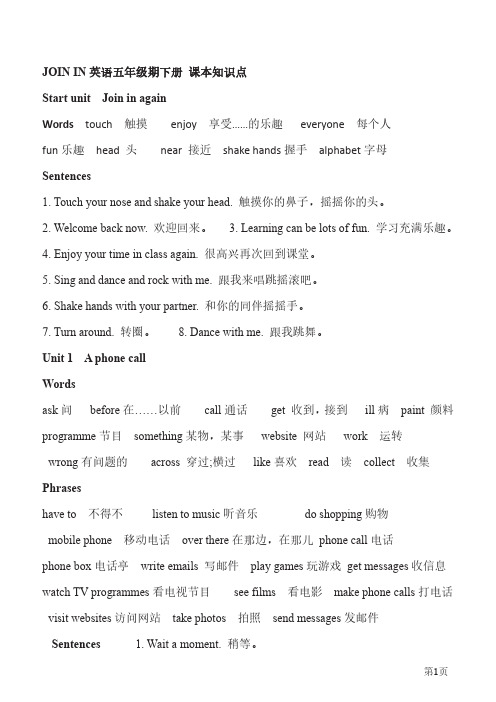
JOIN IN英语五年级期下册课本知识点Start unit Join in againWords touch触摸enjoy享受……的乐趣everyone每个人fun乐趣head头near接近shake hands握手alphabet字母Sentences1.Touch your nose and shake your head.触摸你的鼻子,摇摇你的头。
2.Welcome back now.欢迎回来。
3.Learning can be lots of fun.学习充满乐趣。
4.Enjoy your time in class again.很高兴再次回到课堂。
5.Sing and dance and rock with me.跟我来唱跳摇滚吧。
6.Shake hands with your partner.和你的同伴摇摇手。
7.Turn around.转圈。
8.Dance with me.跟我跳舞。
Unit1A phone callWordsask问before在……以前call通话get收到,接到ill病paint颜料programme节目something某物,某事website网站work运转wrong有问题的across穿过;横过like喜欢read读collect收集Phraseshave to不得不listen to music听音乐do shopping购物mobile phone移动电话over there在那边,在那儿phone call电话phone box电话亭write emails写邮件play games玩游戏get messages收信息watch TV programmes看电视节目see films看电影make phone calls打电话visit websites访问网站take photos拍照send messages发邮件Sentences 1.Wait a moment.稍等。
Joinin剑桥英语五年级下册Unit3第四课时(Parts5,6amp

12.D
13.C
14.E
【分析】
11.根据提示和图片,频度单词为通常usually,故选A。
12.根据提示和图片,频度单词为常常often,故选D。
13.根据提示和图片,频度单词为有时sometimes,故选C。
14.根据提示和图片,频度单词为从不never,故选E。
15.Jack likes cartoons and detective films. /Jack likes detective films and cartoons.
参考答案
1.fifteen/quarter past eight
2.watch TV
3.on Friday
4.在下午
5.boring
6.stupid
【分析】
1.8:15有两种表示方式分别为fifteen/quarter past eight。表示时间,故答案为fifteen/quarter past eight。
五、阅读判断
阅读短文,判断句子正误,正确的写“T”,错误的写“F”。
I'm Barbara. I'm eleven years old. I'm from America. I like watching TV. My favourite programmes are cartoons and detective films. I always watch TV on Saturday and Sunday.
7.C
【详解】
句意为现在电视上演的什么?在电视上on TV,固定搭配,故选C。
8.C
【详解】
句意:节目正在播出。on the air在播出,固定搭配。故选C。
剑桥(join in)版小学英语五年级下册单元知识梳理总结(全册)
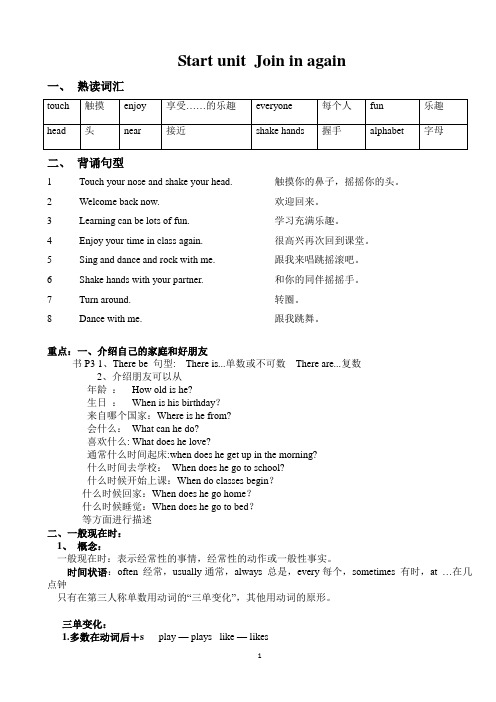
Start unit Join in again一、熟读词汇二、背诵句型1 Touch your nose and shake your head. 触摸你的鼻子,摇摇你的头。
2 Welcome back now. 欢迎回来。
3 Learning can be lots of fun. 学习充满乐趣。
4 Enjoy your time in class again. 很高兴再次回到课堂。
5 Sing and dance and rock with me. 跟我来唱跳摇滚吧。
6 Shake hands with your partner. 和你的同伴摇摇手。
7 Turn around. 转圈。
8 Dance with me. 跟我跳舞。
重点:一、介绍自己的家庭和好朋友书P3 1、There be 句型: There is...单数或不可数There are...复数2、介绍朋友可以从年龄:How old is he?生日:When is his birthday?来自哪个国家:Where is he from?会什么:What can he do?喜欢什么: What does he love?通常什么时间起床:when does he get up in the morning?什么时间去学校:When does he go to school?什么时候开始上课:When do classes begin?什么时候回家:When does he go home?什么时候睡觉:When does he go to bed?等方面进行描述二、一般现在时:1、概念:一般现在时:表示经常性的事情,经常性的动作或一般性事实。
时间状语:often 经常,usually通常,always 总是,every每个,sometimes 有时,at …在几点钟只有在第三人称单数用动词的“三单变化”,其他用动词的原形。
外研版Join In小学英语五年级下册Unit3听写单词表

Unit3听写单词
1
[kɔ:l]
n.喊,叫;电话,通话v.称呼;呼唤;喊,叫;打电话给. . .;把. . .叫做
2
[di'tektiv]
n.侦探a.侦探的
3
['dɪfərənt]
a.不同的,有差异的;有区别的
4
['ɪntrɪstɪŋ]
a.有趣的;有意思的
5
['neitʃə]
n.自然;性质;本性
6
['əʊnlɪ]
a.惟一的,仅有的ad.仅仅,只,才
7
[rəʊˈmæntɪk]
adj.浪漫的,谈情说爱的,多情的,风流的,香艳的;空想的,虚构的,怪诞的,想入非非的,不实际的,难实行的(计划等);小说般的,情节离奇的;浪漫主义的n.富于浪漫气息的人;浪漫主义作家[画家等],浪漫派诗人[艺术家];浪漫思想[行为]
14
[tru:]
a.真的,真实的;正确的
15
['ju:ʒʊəlɪ]
ad.通常,经常
[wɒnt]
vt.想,想要;需要,必要
17
[wail]
conj.在…的时候,和…同时n.一会儿,一段时间
8
[ˈsaiəns ˈfikʃən]
科幻,科学幻想小说;科幻小说
9
[stɑ:]
n.星,恒星v.担任主角;主演
10
[swi:t]
n.甜食;蜜饯;甜点;糖果;芳香a.甜的;新鲜的;可爱的;亲切的
11
['teliviʒən ]
n.电视电视机
12
[ˈteli]
n.(非正式)电视机
13
['θaʊzənd]
num.千n.一千
剑桥(join in)版英语五年级下册Unit 3 Television(5)
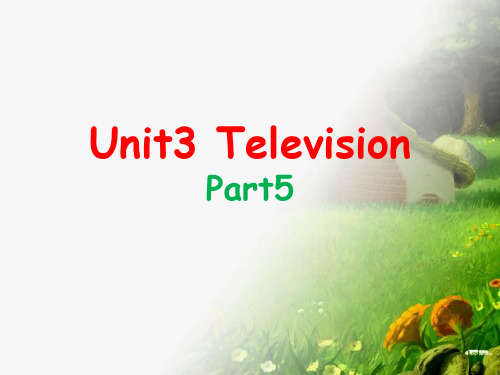
It begins att_w_e_n_ty__t_o_e_i_g_ht_.Mingming will watch it.
His sister __d_oe_s_n_’t__like cartoons. She _t_h_in_k_s_they are boring. She never _w_a_t_c_h_es_ them. She will watch _M_a_n__a_nd__N_a_t_u_r_e_____this afternoon. It begins at _t_w_e_nt_y__p_a_st__f_ou_r in the afternoon. “This programme is _re_a_ll_y_g_r_e_a_t_!” she says.
Watch TV.
Watch TV.
Learn.
Catherine
short for
Cathy I'm also called Cathy.
我也被叫做凯西。
. Interview 用学过的句型采访同桌看电视的情况。
Do you like ing TV?
cartoons
When do you watch TV?
His sister doesn’t like cartoons.She thinks they are boring. She never watches them. She will watch Man and Nature this afternoon. It begins at twenty past four in the afternoon. “This programme is really great!” she says.
- 1、下载文档前请自行甄别文档内容的完整性,平台不提供额外的编辑、内容补充、找答案等附加服务。
- 2、"仅部分预览"的文档,不可在线预览部分如存在完整性等问题,可反馈申请退款(可完整预览的文档不适用该条件!)。
- 3、如文档侵犯您的权益,请联系客服反馈,我们会尽快为您处理(人工客服工作时间:9:00-18:30)。
Unit 3 Television教学设计
(第2课时)
【教学内容】
3a, 3b
【教学目标】
(一)知识与技能
1.能听懂关于电视节目的学生访谈对话,并勾出孩子们喜欢和不喜欢的节目名
称。
2.能用句型…likes / doesn’t like…(电视节目),描述某人喜欢和不喜欢的电视
节目。
(二)过程与方法
1.以小组合作与情景教学为主,运用游戏帮助学生理解与运用所学知识;2.指导学生通过听音获取正确的信息,掌握一定的听音技巧;
3. 采访身边同学的电视观看情况。
(三)情感、态度与价值观
1. 通过电视话题的讨论与访谈,激发学生学习英语的兴趣。
2. 提高他们获取信息和组织语言的能力;培养他们团结合作的学习精神。
【教学重点】
熟练地掌握句型:I like/don’t like nature programmes. Juliet (she)likes/doesn’t like romantic films.
【教学准备】
关于电视的图片、教材相配套的录音带和课件、视频。
【教学过程】
Step 1 Warming up
玩一个“看电视”的游戏:将各类电视节目的画面图片从模型电视框中依次展示给学生,让学生猜猜是什么节目。
学生猜的时候,老师用英语名称配音并重复
几遍,学生会自然模仿。
Step 2 Revision
复习第一课时的重点单词及短语:television, cartoon, detective, anything, short for, Do you like...? Do you usually / often / sometimes / never watch...? What do you think of them?I like / don’t like... I usually / often / sometimes / never watch (I)
think they are …
Step 3 Listen and point
1.学生打开课本到21页,观察3a中的图片。
2.在听之前,老师可以通过以下听力预测活动来帮助学生更好地把握听力材料。
预测活动一:老师指导学生观察题目,预测听力内容。
老师提问:What are they talking about? (TV programmes.) What are they? (Cartoons, sports programmes, science fiction films, detective films, nature programmes, romantic films.)
预测活动二:老师指导学生观察,预测听力材料可能要用到的句型,如:I like / don’t like… I usually / …watch… He / She likes / doesn’t like…
预测活动三:老师让学生观察四个孩子,首先了解他们的名字,学生认读名字:Juliet, Fred, Angela, Frank. 老师指导学生通过孩子们的性别来预测他们可能喜欢的节目,例如:M aybe Juliet likes…Maybe she doesn’t like…
3.老师播放录音,学生听录音勾出孩子们喜欢和不喜欢的节目。
Step 4 Listen and answer
1.师生可采用问答形式核对答案。
如老师提问:
What does Juliet / …like?
What sort of films does Juliet / …like?
What doesn’t she like?
Are there any films she doesn’t like?
Anything she doesn’t like?
2.老师再次播放录音,学生可尝试重复句子。
3.老师示范提问:
Does Juliet like cartoons? Yes, she does.
Does she like science fiction films? No, she doesn’t. (She never watches them.) Step 5 Practice and discuss
1.两人一组对话练习,老师巡视并加以指导。
2.根据学生联系的情况,请4-5组学生进行展示。
3.老师示范介绍孩子们喜欢和不喜欢的节目,例如:Juliet likes cartoons and she
doesn’t like science fiction films.
4.学生小组活动,在组内谈论四个孩子喜欢和不喜欢的节目,老师巡视并加以
指导。
5.老师挑选4-5个学生在班级展示,并及时给予评价。
6.学生小组活动,在组内谈论自己喜欢和不喜欢的节目,老师鼓励学生使用丰
富的句式来谈论。
7.老师挑选4-5个学生在班级展示,并及时给予评价。
Step 6 Play a game
猜猜你好朋友喜欢什么电视节目。
Step 7 Summary
老师让学生看黑板上的板书,与学生一起回顾本课所学的重要单词和句型。
Step 8 Homework
完成本单元练习:Write what the children like / don’t like.
【板书设计】
Unit 3 Television
3a, 3b
cartoon
detective
nature
romantic
…likes / doesn’t like…
something
anything。
